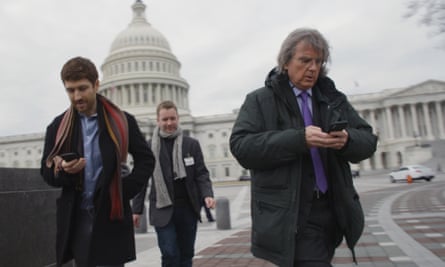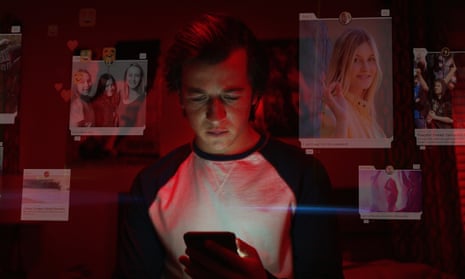In 2010, the writer Zadie Smith urged users of Facebook to step back and consider the look of one’s Facebook “wall”: doesn’t it look ridiculous, she asked, “your life in this format? The last defense of every Facebook addict is: but it helps me keep in contact with people who are far away! Well, email and Skype do that, too, and they have the added advantage of not forcing you to interface with the mind of Mark Zuckerberg.” The year 2010 is basically archaic, in social media terms, and yet Smith was spot on in reading Facebook not as an inspiring phenomenon, or even a world-opening tool of connection, but as a flattening, bottomless manmade trap – a series of narrow, insidious design choices made by a select group of real people.
“Never before in history have the decisions of a handful of designers (mostly men, white, living in SF, aged 25–35) working at 3 companies” – Google, Apple and Facebook – “had so much impact on how millions of people around the world spend their attention,” wrote Google “design ethicist” Tristan Harris in a 144-page PowerPoint manifesto called A Call To Minimize Distraction & Respect Users’ Attention, which exploded within the company in 2013. Then a software designer working to make Gmail more “enjoyable”, Harris was concerned by the company’s ravenous pursuit of profit through attention without consideration of its consequence.
At the time, Harris’s presentation garnered buzz but largely fell on deaf ears; social media and tech companies’ hunger for growth and engagement through distraction and division continued apace. But in the years since the 2016 election, in which Russian disinformation campaigns on Facebook played an influential if not consequential role in helping to elect Donald Trump, numerous tech insiders have joined Harris in publicly condemning the tools they built. “I wish more people could understand how this works, because it shouldn’t be something that only the tech industry knows,” says Harris in The Social Dilemma, a new Netflix documentary on the untenability of our current social media landscape. “It should be something that everybody knows.”
The Social Dilemma, directed by Jeff Orlowski, explores and animates a philosophical shift in Silicon Valley: that the tech industry’s tools, most predominantly social media, aren’t promising tools but too-powerful entities fragmenting attention and rewiring brains by design; that addiction to phones and social media is a function of their business model; that this divisive, degrading status quo is driving us straight to dystopia.
This is a dark conclusion many have already reached, be it relative of a QAnon convert or everyday American whose hand has been reshaped into a phone-sized claw, but the film grounds its critique in first-person warnings from Silicon Valley insiders, most prominently Harris, but also: former Facebook platform operations manager Sandy Parakilas; Bailey Richardson, one of Instagram’s 13 original employees who has since deleted the app; virtual reality pioneer, philosopher and “tech oracle” Jaron Lanier; and Justin Rosenstein, the guy behind Facebook’s “like” button. The film is part accounting of the grave psychological and social damage caused by algorithmic, growth-determined content feeds, as explained by experts such as Dr Shoshana Zuboff, the author of The Age of Surveillance Capitalism, and it’s part dramatization of destructive design choices – Mad Men’s Vincent Kartheiser anthropomorphizes an amoral algorithm programmed to feed addictive and jittering content.
The point is that our current social media impasse, a concentration of power over users made both twitchy and sluggish, is neither acceptable nor changeable without a radical reimagining of tech companies. It’s a far cry from the expansive, hopeful dialogue of the early aughts, when Orlowski repped Apple computers as a Stanford undergraduate and believed the internet “could take us further, and faster – this technology could be massively empowering”, he told the Guardian.
But by 2017, when Orlowski caught up with Harris, an acquaintance from college who left Google in 2015 to form the Center for Humane Technology, a cultural “techlash” over the perils of surveillance capitalism, the psychological damage of social media designed to fragment attention, and the grave threat of widespread misinformation had begun to cement.
That techlash – from the combative anti-trust congressional hearings with tech CEOs last month to the #StopHateForProfit campaign against Facebook – is still a relatively recent phenomenon. When Orlowski began work on The Social Dilemma, in 2017 and early 2018, it was difficult to get people to voice their gnawing concerns on the record. “I don’t think [The Social Dilemma] could’ve been made five years ago,” he said. “It took quite a while until we got to a place where we had enough people on camera who were willing to speak out.”

But by 2018, the power of mushroomed technology companies had forced many in Silicon Valley to re-evaluate the purpose of the tools they built, and the impact of capitalist incentives of design choices. “Technology is not inevitable,” said Orlowski. “People are making it based on, in part, the market and market forces, and in part their values, ethics and choices. Google and Facebook chose to go down a path that really optimized financial profitability.” Facebook, for example, developed a bureau of talent known for “growth hacking” – design that prioritized as much “user” growth as possible to rake in ungodly profits, algorithms that elevated emotionally manipulative, divisive content.
Orlowski compared the scale and rapidity of social media to the discovery of oil, which propelled humanity to previously unfathomed speeds and distances and physical connectivity at devastating long-term ecological cost. Similarly, he said, what once seemed like a utopian promise of connection has been revealed to burn through our data and attention and emotional stability for profit. “We’ve become the resource. We have become the oil,” he said. “They’re mining and extracting us, with no regards for the consequences it has on the society.”
The Social Dilemma is particularly concerned about the political polarization accelerated by social media networks, how Facebook, Instagram, Google and Twitter have “become the digital infrastructure, they’ve become public utilities”, said Orlowski. “They are the backbone of our information communication and yet they are systemically putting people on their own islands of thought.”
But it doesn’t have to be that way – “we can design a better internet,” he said. The US could enact stricter laws around privacy on social media; companies could reorient to deeper connections with fewer people rather than encouraging unlimited reach that collapses context and a sense of scale. We could tax data collection; there could be a shift toward what Lanier calls “data dignity” – ownership over whatever data and insights you contribute to the cloud. There could be platform bankruptcy, in which the giants would reset their user and group follower counts to zero and rebuild from the ground up with robust disinformation and hate speech policies.
But all of these measures would be temporary Band-Aids; many, including several Social Dilemma speakers, have concluded that the behemoth that is Facebook is too large to govern responsibly, making reform impossible; the promised utopia of a connected, generative online world is not achievable with the current architecture of social media, but that doesn’t mean we can’t imagine a better internet.
That’s the hope proffered by The Social Dilemma, which ends on a note of possibility for conscience-oriented tech to guard us from societal doom. “This is a climate change-scale problem,” said Orlowski, noting a comparison of collective, systemic change required over individual action. It’s possible, he said, if you believe in the promise of more humanely oriented technology. “We can design technology that works for humanity,” he said. “It’s absolutely a huge shift, but it’s completely doable.”
The Social Dilemma is available on Netflix on 9 September
